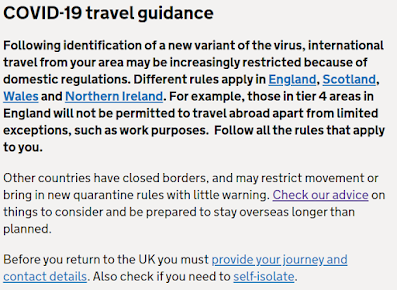
Current UK FCO Travel Advice - 12/20/20
UPDATED: No sooner had I posted this blog, when the following story appeared announcing another ban on travelers from the UK `Belgium to halt UK flights, Eurostar for 24 hours due to coronavirus'.
#15,638
Nearly six weeks ago the UK enacted a ban against travelers going to or arriving from Denmark following the announcement of several mink-variant COVID strains circulating in that country (see UK Enacts Travel Ban From Denmark Over COVID Mutation Concerns).
Many of those restrictions remain in place.
This week, it is the UK that is reporting a new, and potentially more dangerous, strain of COVID (see New COVID-19 Variant Up To 70% More Transmissible). In response, overnight the Netherlands announced a ban on travelers from the UK starting today.
While it is likely too late to contain this UK variant (cases have already been reported in Scotland, Wales, Denmark, and at least one in the Netherlands), there will be many countries eager to slow its spread, now that a vaccine is starting to become available.
There are also media reports of a different variant (501.V2) recently emerging in South Africa, and it would be a fair guess that as SARS-CoV-2 comes under increased evolutionary pressures, additional variants are likely to emerge around the world in the weeks and months to come.
For now, these two variant strains have only been linked to increased transmissibility. Increased virulence, or an ability to evade the current vaccines, has not been demonstrated, although investigations into their characteristics continues.
The official announcement from The Government of the Netherlands follows:
Restrictions on travel from the United Kingdom
News item | 20-12-2020 | 00:59
A contagious new variant of coronavirus has been detected in the United Kingdom. This strain of the virus is thought to spread more easily and more quickly and is also harder to detect. In light of this, on Saturday afternoon, the UK government announced tougher restrictions for London, the South East of England and the East of England. The measures being introduced in the regions in question include the closure of non-essential shops, gyms and entertainment venues, travel restrictions and the urgent advice not to receive any visitors at home.
Sampling of a case in the Netherlands in early December revealed the same virus strain as that observed in the UK. Following the latest reports from the UK, this case is being investigated further. The investigation is being conducted in collaboration with the municipal health service (GGD) and will look into who the individual concerned is, the circumstances in which they were infected and whether there are any known related cases.
On the basis of reports on the situation in the UK, the National Institute for Public Health and the Environment (RIVM) has reviewed the travel advisories for people arriving in the Netherlands from the United Kingdom. Pending further details and greater clarity on the situation in the United Kingdom, RIVM has advised that the risk of the new virus strain being introduced to the Netherlands should be minimised as much as possible by restricting or regulating travel from the UK. As a result, the Dutch government decided this evening to take the following precaution:
- At 06.00 local time on 20 December a ban on flights carrying passengers from the United Kingdom will enter into force. This ban will remain in place until 1 January 2021 at the latest.
The government is closely monitoring developments abroad with regard to coronavirus disease (COVID-19) and is considering additional measures regarding other modes of transport. Over the next few days, together with other EU member states, it will explore the scope for further limiting the risk of the new strain of the virus being brought over from the UK. The government wishes to emphasise once again that travelling abroad carries a substantial risk of spreading coronavirus. Do not travel unless it is absolutely essential.
A letter was sent to the House of Representatives on Saturday evening informing the House of this decision.It is uncertain how effective another round of travel bans would be in slowing the spread of these regional variant viruses - particularly since it can take some time before the threat posed by a new strain becomes apparent - and by then it may be too late to close the barn door.
But it seems likelier than not that other countries will follow suit, particularly if any new strains should emerge that prove more virulent, and/or evades the vaccine.
While the remarkable roll out of multiple vaccines in less than a year brings us tantalizingly close to rounding the corner on this pandemic, we are not out of the woods yet.